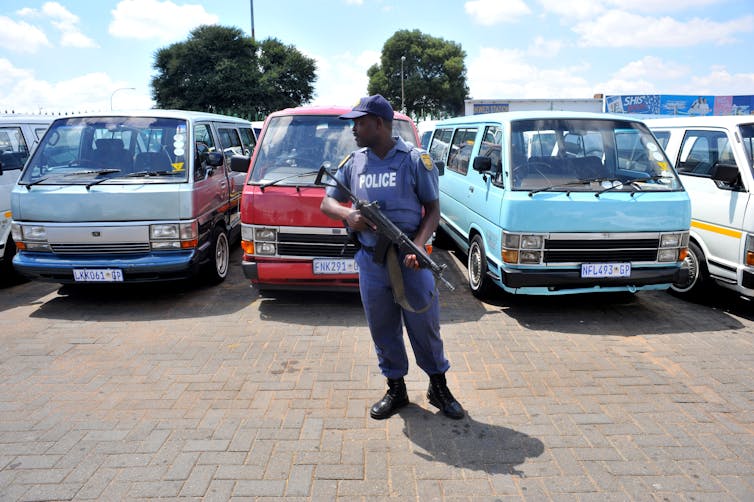Fixing South Africa’s minibus taxi industry is proving hard: tracing its history shows why
By: Siyabulela Christopher Fobosi, University of Johannesburg

Alexander Joe/AFP via Getty Images
The South African government has initiated a process to formalise and regulate the country’s large, yet informal minibus taxi industry, with a view to making it viable and free of violence.
The government envisions the industry being restructured “along legally recognised business units” that pay corporate tax and comply with labour laws. Formalisation will eventually pave the way for taxi commuters to benefit from public transport subsidies, resulting in cheaper fares.
According to Transport Minister Fikile Mbalula
Training of operators and taxi workers across the value chain should be an integral part of the industry development and skilling programme.
The effort, if it succeeds, will resolve the anomaly whereby the government relies on the informal transport sector to provide a key public transport service. Minibus taxis are the preferred mode of transport for most South Africans because they are more efficient and more widely available than buses and trains.
Having studied the various approaches to the industry over the decades, I believe its integration into the country’s public transport plans is long overdue.
It will also bring to an end the industry’s long struggle for economic justice. The following overview provides just a glimpse of the key moments in the history of the industry’s development and struggle for recognition. It is by no means comprehensive.
Historical overview
The minibus taxi industry in South Africa was established by black people and continues to serve mostly that community.
As far as I could establish, the industry traces its origins back to the 1930s, when five-seater sedan cars were used. Then regulation stipulated that taxis could carry four passengers.
The black taxi industry’s battles mirror those of black people against racial oppression and economic exclusion.
Black people were considered temporary residents in the country’s urban areas, and to “belong” instead to ethnically defined, mostly rural areas called bantustans. These were characterised by extreme underdevelopment and poverty.
Blacks were not allowed to live and trade in urban areas unless they qualified for urban rights under the Urban Areas Act of 1945. Being in urban areas legally was made even more difficult by the “pass law”, introduced under apartheid in 1952. It was compulsory for black people to carry identity documents – called passes – that controlled their movements in urban areas.
The early taxi operators used sedan cars and only for trips within black communities. Minibus taxis operated illegally, as public carrier permits were difficult to obtain. At the same time, bus and rail transport was regulated and subsidised, but inefficient.
Black people were only allowed to be involved in one business. Companies and partnerships were prohibited, as were black financial institutions, industries and wholesale concerns.
This changed in the late 1970s when black people were allowed to establish small businesses. Further relief for taxi operators came through the Breda Commission of Inquiry into transport deregulation in 1977. This led to the Road Transportation Act of 1977, which recommended freer competition and less regulation of the industry, making it easier for black people to enter the transport industry.
Its definition of a bus opened the way for taxi operators to introduce ten-seater vehicles. This made the industry more profitable, attracting many new entrants and creating strong growth.
But there were still barriers. The operators were limited to only one vehicle each, in keeping with policies designed to exclude the majority black population from playing a meaningful role in the economy.
Deregulation
The demand for minibus taxi transport far outstripped supply. As too few taxi permits were being issued, the number of taxis operating without permits ballooned as operators sought to satisfy the growing demand.
The government established the Welgemoed Commission in 1983 to study the industry. It recommended that no more permits to operate taxis should be granted.
Even more taxis then operated largely illegally. Taxi operators were subjected to fines, and often had their vehicles impounded and forfeited to the state. Despite the limitations, the demand for taxi services continued to grow fast. Competition over routes grew and often became violent.
Eventually, the Transport Deregulation Act of 1988, in conjunction with the White Paper on Transport Policy, tabled in January 1987, eased restrictions. The government decided to let market forces prevail. Any applicant who wanted to enter the industry was granted a permit to operate a minibus taxi.
The industry kept growing. Profits were reinvested to buy new taxi fleets. Thus, the minibus taxi industry was one of the first in which black people could accumulate capital and gain economic power.
Minibus taxis have special significance as a black-owned industry which survived apartheid laws and without any subsidies to provide an essential service for black people.
Delayed formalisation
After apartheid, from April 1994, efforts were made to bring the industry under some form of regulation and to formalise its operations.
The democratic government established the National Taxi Task Team in 1995 to look for ways to improve safety and profitability and end violent conflicts over routes. The task team recommended that the industry be regulated and formalised.
The state failed due to the lack of willingness to implement the recommendations (and refusal from the industry to be formalised). It continued to support only the formalised bus and train services.
In 1999, the government took another shot at formalising the industry. It introduced the Taxi Recapitalisation Programme to remove old, unsafe minibuses and replace them with safer ones.
Read more:
South Africa’s minibus taxi industry has been marginalised for too long. This must change
The government envisioned a new, regulated taxi industry, using larger 18-seater and 35-seater diesel powered vehicles. The old, smaller taxis were to be phased out to reduce the number of vehicles on the road and improve safety. Operators who agreed to scrap their old taxis were paid R50,000 for each, to buy a new, compliant one.
The programme was revised in 2019 and the scrapping allowance was increased.
But only 72,690 old vehicles had been scrapped by the end of September 2018, in the 12 years since 2006, against a readjusted target of 135,894.
Shaping a future industry
The minibus taxi industry plays an important role in the economy of the country. Besides being the preferred transport mode for most commuters, it’s also a significant contributor to tax revenue and employment.
Equally importantly, it is one sector of the economy that is dominated by the black community, which was marginalised during colonialism and apartheid.
It is vital that the latest move by government towards formalisation results in an industry that is safe, reliable and viable so that it can keep contributing to the country’s economy. But the history of imposing unreasonable rules tells us that for this to succeed, the industry must be included in planning the route to its own future.![]()
Siyabulela Christopher Fobosi, Senior Researcher, UNESCO ‘Oliver Tambo’ Chair of Human Rights, University of Fort Hare, University of Johannesburg
This article is republished from The Conversation under a Creative Commons license. Read the original article.
Written by: Natasha
Similar posts
MORE ARTICLES

In Pictures: Mzansi Celebs serve style and drama at Durban July 2025

Five killed in KZN crash allegedly caused by Polo driver

From Benin to the world: Kidjo makes history as first black African on Hollywood Walk of Fame

Drama, cheating and Surprise guest: RHOD reunion delivers shocking revelations

Why Waterfall Estate’s 99-year lease is practically forever
QUICK LINKS
UpComing Shows

On the Beat
On the Beat with George Manyosi on Kaya 959. Saturday's, 18pm-21pm.
close
Touch of Soul
With T Bose
Kaya 959 takes back Sundays with A Touch of Soul, the only show bringing you soul and RnB music that touches your mind, body and spirit. The Best T in the City, T-bose takes you back to a time when music was made to last. A Touch of Soul is the perfect wind-down to your weekend. Sundays 14h00 to 18h00.
close
The Jazz Standard
with Brenda Sisane
The Jazz Standard with Brenda Sisane. Sunday's 12:00-15:00.
close
Spade of Hearts
With Xola Dlwati
WITH XOLA DLWATI: SATURDAYS 12:00 -15:00 Spade of Hearts is a fuse of love and soulful sounds, pulling at your heartstrings. Tune in for songs that will take you down memory lane. It is the sound that once dominated your playlist. It airs Sundays 12:00 – 15:00.
close
The World Show
With Nicky B
The World Show is informative, expansive, and largely pan-African. This is a musical journey that bridges generations and genres, travelling across continents and timelines, with in-depth interviews and features. ‘The World Show’ is a four-hour global journey through sound – featuring the freshest tracks from home and afar.
close
959 Music Weekdays
Kaya 959 Hits
Real. Familiar. Memorable. Kaya 959 brings you the music you know and love from our playlist. Uninterrupted. Thursdays 20h00 to 21h00
closeConnect with Kaya 959
DownLoad Our Mobile App
© 2025 Kaya 959 | On The Street On The Air








